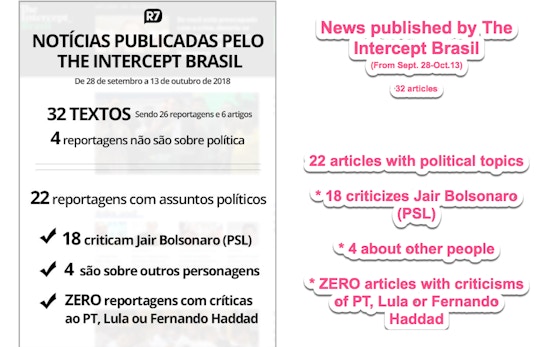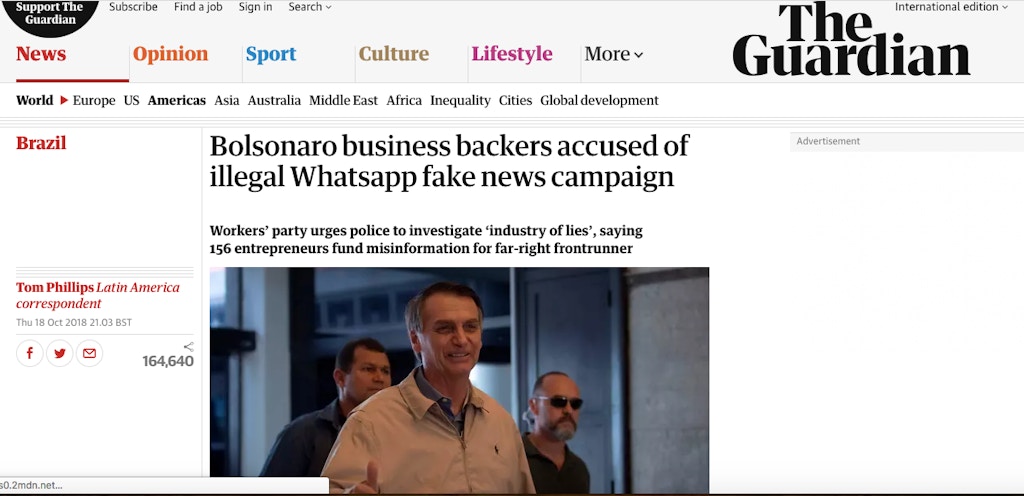By Glenn Greenwald
The highly likely ascension to power of far-right extremist Jair Bolsonaro is already unleashing a climate in which journalists who are critical of him and his movement – including several writing for the Intercept – are being subjected to an aggressive campaign of personal investigation, attempted intimidation, and thuggish scrutiny of family members.
These attacks are being orchestrated by the media outlets owned by a far-right, scandal-plagued, evangelical pastor-billionaire, Edir Macedo (universally known as The Bishop and founder of the sprawling Universal Church of the Kingdom of God), who is now an explicit supporter of Bolsonaro. Macedo’s vast media empire – one that includes the nation’s second-largest TV outlet (Record), online portals (R7) and various other news agencies – is now being flagrantly abused to impose punishment and retaliation against journalists for the crime of reporting critically on Bolsonaro, his movement, and Macedo’s companies.
On Saturday (Oct. 13), The Intercept published, in Portuguese, an exposé on how journalists inside R7, a huge online portal owned by Macedo, are “hostages” to their owner’s agenda, barred from publishing negative stories about Bolsonaro and generally forced to sacrifice their journalistic integrity to serve Macedo’s extremist political agenda. Written for the Intercept by the Brazilian journalist Leandro Demori, the article was based on reports from distraught R7 journalists who spoke anonymously. The article went viral in Brazil, quickly becoming one of the most widely read Intercept articles of the year. On Thursday, in the wake of that reporting, the long-time chief of Record TV’s flagship news program, Luciana Barcelos, resigned.
Throughout 2018, The Intercept has published some of the most aggressive and widely read investigative reporting in Portuguese that has been critical of the Bolsonaro movement. Indeed, long before a Bolsonaro presidency was even thinkable, when he was still a fringe member of Congress, The Intercept has been critically covering him; in a 2014 article, after he told a female colleague in Congress that she was too ugly to “deserve” his rape, we pronounced him “the most misogynistic, hateful democratic official in the democratic world.” Late last year, Bolsonaro, to his large Twitter following, used an ugly epithet for LGBTs to, in essence, pronounce me a faggot after I described him as a fascist.
The Intercept has also, in a series of investigative articles written by Brazilian journalists for The Intercept, shed extensive light on the strangely stalled police investigation into the assassination last March of Rio de Janeiro City Councilwoman Marielle Franco, the black, LGBT, favela-born, leftist human rights activist who devoted her career to denouncing police abuse and human rights violations until assassins ended her life with four bullets in her head, as she rode in a car on a Rio street.
Ever since publication of Saturday’s report about R7, the captive operatives inside Macedo’s media conglomerate – those who once functioned as journalists but have now been forcibly converted into Bolsonaro warriors – have been intensively investigating not only the journalists at the Intercept but also our families. In a very short time following our report, they scrutinized the personal lives of Demori’s parents in a small town in the interior of a state in southern Brazil, Santa Catarina, raising issues that have nothing to do with Demori or his career, dating back to 1992 when he was only 11 years old. They dug into Demori’s distant past to find pictures of him in his early twenties.
They sent emails to The Intercept with a series of questions containing implicit accusations, insinuations of fabricated scandals, misrepresentations about my husband’s finances (a Rio de Janeiro City Council member from the same party as Franco), and various other questions premised on false accusations. In the e-mail they sent us, they used public information about my husband’s assets and election spending to insinuate wrongdoing, ignoring other equally public information that was easily accessible in the same venue that disproved their malicious version.
Less than two days after publication of The Intercept’s exposé of the abuse of R7’s journalists for pro-Bolsonaro propaganda, that outlet – on Monday, Oct. 15 – published a reckless, falsehood-filled attack on the journalists who provide the Intercept’s reporting, myself and my husband. It:
- claimed, falsely, that I was the “owner” of the publication (I am not, and never have been, an owner, nor have I ever been the Editor);
- depicted the Intercept as a foreign vehicle designed to interfere in Brazilian politics by relentlessly attacking Bolsonaro and advancing the interests of my husband’s left-wing political party (the articles about Brazil published in the Intercept are researched and written primarily by Brazilian journalists; many have indeed been critical of Bolsonaro, but many other articles have criticized all left-wing parties – my husband’s included – including a scathing 2016 critique of his party (PSOL) authored by me);
- stated that I killed articles that were politically inconvenient to my husband’s political party (articles I never in fact saw or even heard of);
- failed to include any comments or responses from The Intercept, despite a lengthy response to questions sent the night before publication of the article (two comments from Demori were finally added only hours after publication).
The shoddiness of their attacks caused that article to backfire. Though the article was widely shared by hard-core Bolsonaro followers, online responses were overwhelmingly negative, highlighting the obviously false claims, the incoherent accusations, and the slapshot attempt to throw mud in the hope that something sticks.
But now the Macedo organization’s efforts have become much more serious, thuggish and sinister. They have notified The Intercept of their intention to publish what they obviously view as some sort of major exposé about us, to be broadcast on their flagship, Sunday-night, 60-Minutes-style news magazine this Sunday, and have demonstrated that they expended substantial resources to investigate the past of not just journalists who provide reporting for the Intercept but also family members.
Beyond investigating Demori’s family: to substantiate the truly absurd accusation that Demori is affiliated with the same left-wing party as my husband (PSOL), Macedo’s operatives somehow found a 10-year-old photograph of Demori with a PSOL politician, Luciana Genro. The photo was taken after Demori interviewed Genro, something that reporters by definition do (I, for instance, took photographs with all of the presidential candidates I interviewed this year, as well as the former presidents I interviewed in 2016).
A 2008 photograph of Leandro Demori after he interviewed PSOL’s Luciana Genro, provided by Record with Demori circled (The Intercept blurred the faces of unrelated persons)
Ironically, Demori, three months before that interview with Genro, happened to also interview the right-wing figure who is now Bolsonaro’s right-hand man and an almost-certain cabinet Minister in his future government, Onyx Lorenzoni, and he photographed himself with Lorenzoni. By Record’s reasoning, one could argue this old photograph proves that Demori is a fanatical Bolsonaro supporter:
Demonstrating Record’s motive of retaliatory vengeance is its bizarre, sudden interest now – eight days before a major national election – in the finances of my husband, merely a member of the City Council of Rio de Janeiro who is not even a candidate in the Oct. 27 run-off election. This decision to investigate him is particularly notable given Record’s utter lack of interest in a major scandal implicating the Bolsonaro campaign, one that has attracted international media attention: namely, allegations that Bolsonaro benefited from illegal corporate money spent on a massive campaign to spread fake news en masse via WhatsApp. That’s a story – one potentially fatal to the Bolsonaro campaign – that R7 has buried.
Indeed, in contrast to foreign outlets that have covered the story aggressively, the front page of the R7 portal does not even mention this huge Bolsonaro/WhatsApp scandal. R7 and, it seems now also Record TV, are barely trying to hide the fact that they are not doing journalism, but rather a revenge mission for our critical reporting on Bolsonaro and his billionaire-pastor supporter who owns all these media outlets.
When R7 first contacted The Intercept on Sunday seeking comment for its original story, the news organization provided them with a lengthy response to their questions. But once we saw that they published an article filled with obvious falsehoods – one that did not even include any of the quotes or responses we provided (small parts were added only hours after publication) – Intercept editors reached the only rational conclusion: that they were not doing journalism in any recognizable form, but a campaign of intimidation and defamation as punishment for our reporting on Bolsonaro and Macedo.
As a result, when Record’s TV program requested an interview to explore much more extensive questions about Demori’s past, his family’s 20-year-old real estate transactions, my husband’s finances, and inquiries about the Intercept’s structure, the Intercept’s Editor-in-Chief Betsy Reed refused to respond further, explaining to Record’s Diego Costa:
I received your request for an interview. Rather than speaking with you, we are providing this statement, because as you just proved with your error-filled article published yesterday on your portal R7, you are not journalists, but rather party operatives of the far right captive to the right-wing extremist agenda of your owner. In a reply prepared for The Intercept by Leandro Demori, which you unethically failed to include in the article R7 published on Monday, we maintain the piece you are planning is obviously a petty, retaliatory tactic in response to the Intercept’s recently published, viral reporting on R7, documenting the pressures imposed on Edir Macedo’s employees to produce pro-Bolsonaro propaganda in accordance with his political preferences.
Betsy Reed, Editor-in-Chief
By all appearances, including follow-up emails posing the same accusatory questions and others ones as well, Macedo’s organization continues to investigate the Intercept, the journalists who report for it, and our families, and intends to broadcast these defamatory and false accusations to millions of people on its Sunday night television show this weekend.
Who is Edir Macedo, and how did he get so rich and powerful? It’s a simple story: now a Forbes list billionaire, he has raked in vast personal wealth from enormous numbers of poor Brazilian parishioners by founding Brazil’s largest evangelical church, the Universal Church of the Kingdom of God, which, in the words of Forbes, “follows ‘prosperity theology,’ asserting that faith and commitment to a church are rewarded with wealth.”
Scandals, investigations, and questions about the source of his wealth have plagued Macedo for decades. As the Los Angeles Times reported about Macedo in 2009, “the founder of one of Brazil’s biggest evangelical churches siphoned off billions of dollars in donations from his mostly poor followers to buy jewelry, TV stations and other businesses for himself, authorities charged Tuesday.” It added, regarding charges that Macedo has always denied: “The Sao Paulo state prosecutor’s office alleged in a statement that Macedo and the others took more than $2 billion in donations from 2003 to 2008 alone, but charged that the alleged scheme went back 10 years,” and that:
Prosecutors said the Universal Church of the Kingdom of God receives nearly $800 million in donations every year from church members across Brazil. Authorities alleged that the church used fake companies to launder the money.
A court ultimately ruled that the case asserting these charges was brought in the wrong forum (that it belonged in the federal rather than the state judiciary), and thus dismissed it on jurisdictional grounds.
But what converted Macedo from massively rich bishop into a major power player in Brazilian politics was his 1990 purchase of Record TV, Brazil’s second-largest television network after Globo. As Forbes put it: “It’s unclear how he got the funding to purchase the company: Brazil’s Public Ministry has probed into the question for more than ten years while some reports have alleged that he used church funds.”
A 2013 investigation by Bloomberg said of the Record TV purchase that “the transaction led to an investigation by Brazil’s tax agency, which found that he’d used interest-free loans from the Universal Church to fund it, and fined him for failing to declare the loans as income.” A federal judge ultimately rejected criminal charges that Rede Record was acquired through fraudulent means, arguing that it was impossible to prove that fake owners were used to mask the real ownership.
Macedo’s legal and criminal investigations and media exposés are too numerous to count. As G1 put it in 2009, citing an exposé by Veja Magazine: “Accused of using donations of worshipers for private and commercial purposes, Bishop Edir Macedo and his wife, Ester Eunice Rangel Bezerra, are owners of two luxury apartments in Miami, USA.” It added: “Between 2001 and 2008, the church earned $ 8 billion in donations from its approximately 8 million followers. According to the magazine, the Public Prosecutor’s Office discovered that the money was spent as part of payment for facade companies controlled by members of the group.” Those allegations were part of what the court ruled had been brought in the wrong jurisdiction.
Criminal allegations about Macedo continue to proliferate and worsen. As the Washington Post reported this year about an investigation in Portugal: “Wealthy televangelist Macedo, head of the Universal Church of the Kingdom of God, is under investigation for money laundering, tax evasion and allegations that he ran a human-trafficking ring involving adopted children, authorities say.” The Portugal Resident added regarding allegations that the Church denies: “Brazilian media billionaire Edir Macedo is being accused of involvement in an alleged illegal adoption network that stole dozens of Portuguese children during the 90s. The accusation comes in an explosive series of reports compiled by investigative journalists working for TVI24.”
Since purchasing Record, Macedo has repeatedly used the television network to promote far-right politics and religious fanaticism. He used its proceeds, a large portion of which come from advertising and other revenues from his mega-church, to expand his media empire to include the online portal R7, now the seventh-most visited site in all of Brazil, as well as other news agencies.
In late September, Macedo publicly confirmed what everyone has long suspected: that he was supporting Bolsonaro for President (he originally appeared to support the establishment-backed, banker-friendly, right-wing, Jeb-Bush-like Governor of São Paulo, Geraldo Alckmin, whose campaign was a Jeb!-like debacle). And since he publicly proclaimed his support for Bolsonaro, Macedo’s media outlets have been thinly disguised, relentless propaganda machines for his presidential candidate.
In the days leading up to the first-round voting on October 7, Bolsonaro announced that he would skip the Globo TV debate – traditionally the most important debate in the election cycle, claiming that his wounds from the stabbing he suffered the month before medically prevented him from participating. But then Record announced that it would broadcast – at exactly the same time as the Globo debate – an “exclusive” interview with Bolsonaro, which contained questions so glorifying and sycophantic that it was surprising that the interviewer didn’t formally drop to his knees.
It was in that context that Macedo-machine journalists began widely complaining, from behind a protective wall of anonymity, that they have been converted from journalists into hostage-like messaging machines for a candidate widely, and credibly, viewed as fascist. And that was what enabled The Intercept to report on the inner workings of R7 and the severe pressure its writers are under to distort the truth and churn out pro-Bolsonaro, anti-PT agitprop.
But it’s one thing for Macedo to use his massive wealth and media empire to elect a fascist. It’s another entirely for him to exploit and abuse those media outlets to intimidate, investigate, and threaten journalists for the crime of reporting on Bolsonaro and his media outlets. That conduct is a serious threat to a free press: it is virtually impossible to freely report on Bolsonaro if one knows that Macedo’s infinite wealth and powerful outlets will be used to smear not only the journalists responsible but their family members as well.
Macedo and his machine can spend as much money as they want, and use their megaphone as loudly as they want, to defame and lie and distort. That will, at least according to their own claimed plans, happen yet again on Sunday night. But the Intercept will nonetheless maintain its steadfast commitment to independent, intrepid journalism, which most certainly includes, now more than ever, aggressive and critical scrutiny of Jair Bolsonaro and the billionaire bishop trying to empower him.




















